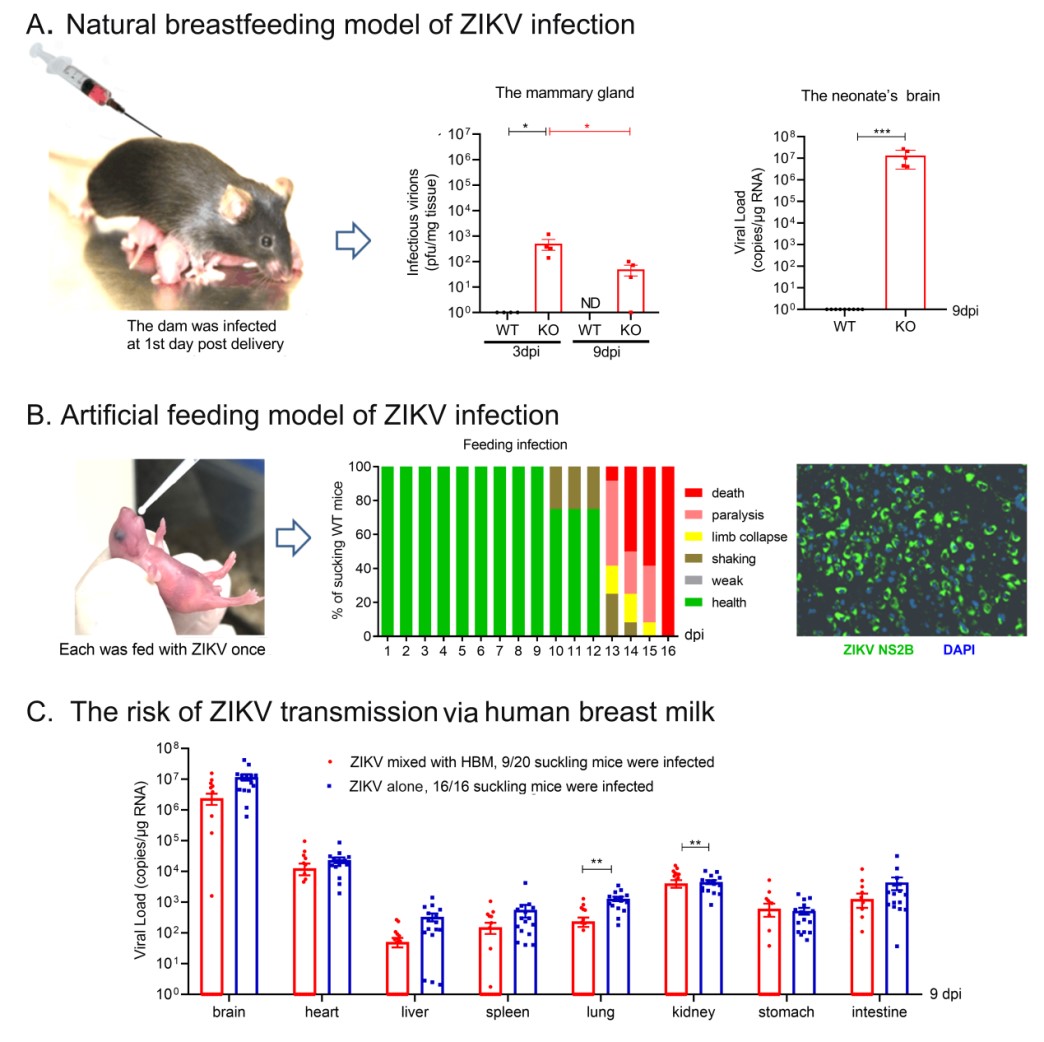Zika virus (ZIKV) is an arbovirus and mainly transmitted in humans by several Aedes mosquitoes, especiallyAedes aegypti. It has caused a series of epidemics in Africa and Asia since 1947. Its explosive outbreak in Brazil in 2015 and association with foetal microcephaly evoked global attention,and furtherprompted the World Health Organization to issue a global health emergency. In 2018, ZIKV re-emerged in India, suggesting that the virus is circulating. Recently, some sporadic reports have revealed detectable ZIKV RNAs and infectious viral particles in human breast milk. The neonates breastfed by the milk were born asymptomaticly with ZIKV infection, or even with microcephaly. “This raised the question of whether or not ZIKV can be vertically transmitted from mother to infant during breastfeeding.” Professor ZHENG Yongtang said, who is a member of Key Laboratory of Animal Models and Human Disease Mechanisms of Kunming Institute of Zoology, Chinese Academy of Sciences.
However, it is difficult to determine whether ZIKV in infected infants originated from mother’s milk exclusively, as even the ZIKV sequences generated from the mother's breast milk and newborn are identical, because transmission of ZIKV from mother to infant involves other high-risk factors including intrauterine or intrapartum transmission, exposure to maternal blood, and unknown mosquito bite.
The group of Prof. ZHENG dedicated to understand the role of breast milk in ZIKV transmission. Firstly, a natural breastfeeding model of mice was established. ZIKV could infect IFNα/β receptor-deficient adult mice after delivery. A high level of viral particles was detected in mammary glands, and ZIKV could be transmitted to immunodeficient suckling mice through breastfeeding. However, the wild type (WT) adult mice were not susceptible to ZIKV, and only a few viral particles were detectable in the mammary glands of WT mice, ZIKV was not transmitted to immunocompetent suckling mice via breastfeeding. To solve this problem, they sought an artificial feeding model of ZIKV infection in neonatal immunocompetent mice. ZIKV was carefully ingested into the WT newborn’s mouth without touching its nasal cavity and puncturing the skin, and then the newborns were mother-nursed. Interestingly, the WT suckling mice were infected with ZIKV via breast milk this time. It means ZIKV might be transmitted through milk.
Human breast milk is a necessary nursing source for the infant. It contains anti-viral bioactive substances that protect the infant from some bacterial or viral infection. To further evaluate the possibility of ZIKV transmission through breast milk, They mixed human breast milk from health mother with ZIKV and fed them to the WT suckling mice, and found breast milk had a role to suppress, but cannot block ZIKV infection. A total of 45% suckling mice was infected. Thus, there is a putative risk of ZIKV transmission via breast milk.
This study, for the first time, demonstrated that ZIKV can infect suckling mice through breast milk, provided a novel mice model for ZIKV infection, and facilitated assessments of the possible feeding route of ZIKV transmission. As we know, most ZIKV infections are asymptomatic, and few breast milk samples were examined from infected mothers, so newborns and infants infected with ZIKV might be greatly underestimated. To clarify this, large population-based cohort studies on the clinical characteristics of ZIKV infection in infants are needed, and more attention should be paid to supervise the possible ZIKV infection of breast milk.
This study was published online recently in Clinical Microbiology and Infection (DOI: 10.1016/j.cmi.2020.04.021).

Zika virus can be transmitted through breast milk in suckling mice models(Image by ZHENG Yongtang)
Contact:
HE Linxi
helinxi@mail.kiz.ac.cn

